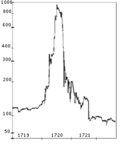
Back بوابة:الاقتصاد Arabic Portal:İqtisadiyyat Azerbaijani প্রবেশদ্বার:অর্থনীতি Bengali/Bangla Portal:Ekonomija BS Portal:Economia Catalan دەروازە:ئابووری CKB Portál:Ekonomie Czech Portal:Wirtschaft German Πύλη:Οικονομία Greek Portal:Economía Spanish
The Business and Economics Portal  Business is the practice of making one's living or making money by producing or buying and selling products (such as goods and services). It is also "any activity or enterprise entered into for profit." A business entity is not necessarily separate from the owner and the creditors can hold the owner liable for debts the business has acquired. The taxation system for businesses is different from that of the corporates. A business structure does not allow for corporate tax rates. The proprietor is personally taxed on all income from the business. A distinction is made in law and public offices between the term business and a company such as a corporation or cooperative. Colloquially, the terms are used interchangeably. (Full article...) Economics (/ˌɛkəˈnɒmɪks, ˌiːkə-/) is a social science that studies the production, distribution, and consumption of goods and services. Economics focuses on the behaviour and interactions of economic agents and how economies work. Microeconomics analyses what is viewed as basic elements within economies, including individual agents and markets, their interactions, and the outcomes of interactions. Individual agents may include, for example, households, firms, buyers, and sellers. Macroeconomics analyses economies as systems where production, distribution, consumption, savings, and investment expenditure interact; and the factors of production affecting them, such as: labour, capital, land, and enterprise, inflation, economic growth, and public policies that impact these elements. It also seeks to analyse and describe the global economy. (Full article...) Selected article
John Davison Rockefeller, Sr. (July 8, 1839–May 23, 1937) was an American industrialist and philanthropist who played a pivotal role in the establishment of the oil industry, and defined the structure of modern philanthropy. In 1870, Rockefeller helped found the Standard Oil company. Over a forty-year period, Rockefeller built Standard Oil into the largest and most profitable company in the world, and became the world's richest man.
His business career was controversial. He was bitterly attacked by muckraking journalists; his company was convicted in the Federal Court of monopolistic practices and broken up in 1911. He gave up active management of Standard Oil in the late 1890s, while keeping a large fraction of the shares. He spent the last forty years of his life focused on philanthropic pursuits, primarily related to education and public health. He donated most of his wealth using multiple foundations run by experts. He was a devout Northern Baptist and supported many church-based institutions throughout his life. Rockefeller may ultimately be remembered simply for the raw size of his wealth. In 1902, an audit showed Rockefeller was worth about $200 million, compared to the total national wealth that year of $101 billion. His wealth grew significantly after as the demand for gasoline soared, eventually reaching about $900 million, including significant interests in banking, shipping, mining, railroads, and other industries. By the time of his death in 1937, Rockefeller's remaining fortune, largely tied up in permanent family trusts, was estimated at $1.4 billion. Rockefeller's net worth over the last decades of his life would easily place him among the list of wealthiest persons in history. As a percentage of the United States economy, no other American fortune—including Bill Gates or Sam Walton—would even come close. Selected image
Selected economyThe economy of Mexico is a developing mixed-market economy. It is the 13th largest in the world in nominal GDP terms and by purchasing power parity as of 2024. Since the 1994 crisis, administrations have improved the country's macroeconomic fundamentals. Mexico was not significantly influenced by the 2002 South American crisis and maintained positive, although low, rates of growth after a brief period of stagnation in 2001. However, Mexico was one of the Latin American nations most affected by the 2008 recession, with its gross domestic product contracting by more than 6% that year. Among OECD nations, Mexico has a fairly strong social security system; social expenditure stood at roughly 7.5% of GDP. (Full article...) Selected quote"When the Aldrich-Vreeland Emergency Currency Bill was sprung on the House in its finished draft and ready for action to be taken, the debate was limited to three hours and Banker Vreeland placed in charge. It took so long for copies of the bill to be gotten that many members were unable to secure I copy until within a few minutes of the time to vote. No member who wished to present the people's side of the case was given sufficient time to enable him to properly analyze the bill. I asked for time and was told that if would vote for the bill it would be given to me, but not otherwise. Others were treated in the same way. Accordingly, on June 30th, 1908, the Money Trust won the first fight and the Aldrich-Vreeland Emergency Law was placed on the statute books. Thus the first precedent was established for the people's guarantee of the rich man’s watered securities, by making them a basis on which to issue currency. It was the entering wedge. We had already guaranteed the rich men's money, and now, by this act, the way was opened, and it was intended that we should guarantee their watered stocks and bonds. Of course, they were too keen to attempt to complete, in a single act, such an enormous steal as it world have been if they had included all they hoped ultimately to secure. They knew that they would be caught at it if they did, and so it was planned that the whole thing should be done by a succession of acts. The first three have taken place. Act No. 1 was the manufacture, between 1896 and 1907, through stock gambling, speculation and other devious methods and devices, of tens of billions of watered stocks, bonds, and securities. Act No. 2 was the panic of 1907, by which those not favorable to the Money Trust could be squeezed out of business and the people frightened, into demanding changes in the banking and currency laws which the Money Trust would frame. Act No. 3 was the passage of the Aldrich-Vreeland Emergency Currency Bill, by which the Money Trust interests should have the privilege of securing from the Government currency on their watered bonds and securities. But while the act contained no authority to change the form of the bank notes, the U. S. Treasurer (in some way that I have been unable to find a reason for) implied authority and changed the form of bank notes which were issued for the banks on government bonds. These notes had hitherto had printed on them, “This note is secured by bonds of the United States.” He changed it to read as follows: “This note is secured by bonds of the United States or other securities.” “Or other securities” is the addition that was secured by the special interests. The infinite care the Money Trust exercises in regard to important detail work is easily seen in this piece of management. By that change it was enabled to have the form of the money issued in its favor on watered bonds and securities, the same as bank notes secured on government bonds, and, as a result the people do not know whether they get one or the other. None of the $500,000,000 printed and lying in the U. S. Treasury ready to float on watered bonds and securities has yet (April, 1913) been used. But it is there, maintained at a public charge, as a guarantee to the Money Trust that it may use it in case it crowds speculation beyond the point of its control. The banks may take it to prevent their own failures, but there is not even so much as a suggestion that it may be used to help keep the industries of the people in a state of prosperity"
TopicsRelated WikiProjectsDid you know (auto-generated) -
On this day in business history
General imagesThe following are images from various business-related articles on Wikipedia.
More did you know
Business news
SubcategoriesRelated portals
Things you can doUrgent and important articles are bold
WikimediaThe following Wikimedia Foundation sister projects provide more on this subject:
SourcesDiscover Wikipedia using portals |
© MMXXIII Rich X Search. We shall prevail. All rights reserved. Rich X Search









































